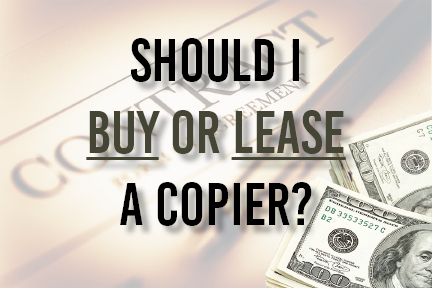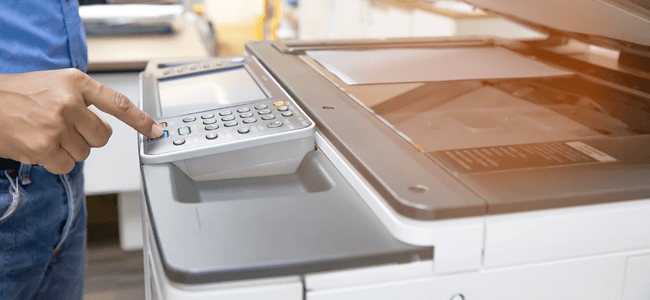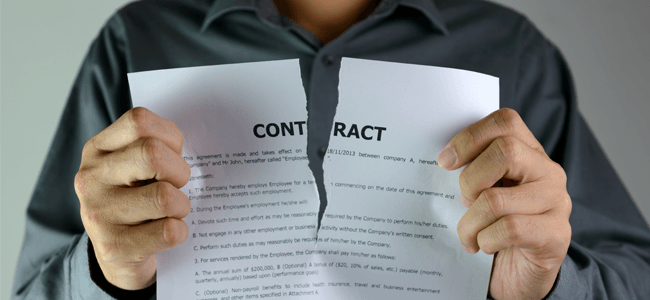
COPIERS | 6 MIN READ
Our company serves thousands of businesses of vastly different sizes each year. One of the most common questions we receive is "Should I lease or buy a copier?" Keep reading to learn the pros and cons to leasing and buying a copier as well as other points to consider.
Not enough time? Jump to:
Should I Buy?

Dealers who lease copiers take on an inherent financial risk when doing so, since some customers may not finish making payments.
To counteract this, the total lease price may sometimes end up higher than if you purchased the machine outright. Up-front purchases can save your company a small amount, possibly a few hundred dollars on a machine costing over $10,000.
When you buy a copier, you also aren't locked into long-term contracts. While it may make more sense from a budgeting standpoint to spread out the cost of a copier over a few years, if you have room in your budget to buy it up-front, then you might find that that is a better solution for your business.
However, keep in mind that buying a copier means that you may not have service pricing built in like you would with a leased machine. Additionally, copiers are like cars, whose value depreciates once they leave the lot. If you buy a copier and decide to sell it later, you might have trouble getting a good return on investment.
You also have to invest time finding someone to buy your copier, which can get exhausting if there aren't many interested buyers.
RELATED: Copier Dealers vs Manufacturers: 3 Myths Busted
Should I Buy a Used Printer?
Along with deciding whether or not you want to buy a printer comes the decision of getting a new or used machine.
With new machines, you may not have to worry as quickly about service and repairs. This can save your company some money as well as the headache associated with coordinating machine repairs.
However, with used printers comes the obvious cost savings. Sometimes, printer dealers have used printers in their inventory that are basically new and were quickly returned by a customer because they switched to another dealer, etc. In this case, you can get an almost new printer at a used price!
RELATED: Used Copier: What You Didn't Know
Terms to Look for When Cancelling a Copier Lease

Let's say you decide to buy buy are currently stuck in a bad lease agreement. How do you get out of it?
Most contracts (provided by any business) are long and stale to read. They are designed to cover as many scenarios as possible to protect both parties, but more times than not, they are designed to protect the party issuing the contract. Here are some things to look for when you are reviewing your Service Level Agreement (SLA):
Automatic Renewals
A clause regarding automatic renewals will most likely be written into your agreement. This protects the service provider from losing someone’s business at the drop of a hat. Traditionally, you (the customer) are required to provide a Letter of Intent to terminate service 30-90 days prior to the end of your agreement.
If you fail to provide this Letter of Intent, the contract can auto-renew, and most contracts renew for an additional 12 months. Make sure you understand the cancellation procedure even if your agreement is about to expire.
Breach of Contract
It is possible to break a service contract, but like most contracts, it is difficult. Contracts protect the customer and the provider. The only way you can get out of a service contract is with gross negligence on the part of the provider. This doesn’t mean their service is slow or that the machine breaks down too often.
Gross negligence would have to be more extreme, like the provider not maintaining the equipment at all and never coming out to fix your machine. Make sure you understand how often your copier should be serviced and know if your agreement is appropriate for your equipment; otherwise, you may expose yourself to extended downtime, without any recourse.
Keep in mind that a quality service provider will do what they can to keep your business and build brand trust, even if that ultimately means objectively admitting their faults and allowing you out of your service agreement.
Early Termination Fee
Many copier dealers and manufacturers will place penalties in their contracts for terminating early or breaching their policies regarding the termination process. Some only administer penalties if you breach their Letter of Intent policies, and others will hold you to finishing your entire agreement, even if you switch providers.
Before getting into a long contract with a copier company, make sure you know if they have early-cancellation penalties built into their contract.
Lease Buyout
Often, there are scenarios where a competing dealer will agree to “buyout” your lease in an effort to earn your business. In this situation, the competing dealer will roll the cost of your remaining lease into their new lease. This allows them to recoup the money spent in paying-off your old equipment.
So, are you really getting a buyout? Not really. This is more like refinancing your existing equipment by spreading your remaining lease payments over the next 36-60 months while affording yourself the freedom to upgrade your existing copiers, today. Every dealer and manufacturer does this, so you can be sure this is not a proprietary secret.
RELATED: How Do I Get Out of My Copier Lease?
Should I Lease?
Leasing can be easier to budget for. For companies that don't have room in their budget to spend thousands of dollars at one time, especially if you're buying multiple machines, breaking up a big payment over 2-3 years can make more economical sense.
As we previously discussed, the total price of a leased copier does usually end up costing more than one you buy. However, keep in mind that copier technology is constantly changing. Especially as the world becomes increasingly digital and cyber security becomes more of a chief concern for businesses, newer models will continue to be released.
When you buy a copier, you're stuck with that machine until you sell or upgrade it. Leasing agreements may sometimes include automatic upgrades at the end of the leasing period, potentially for less than the current monthly lease payment. This ensures that your business stays in step with industry advancements.
Which is Better?

The decision of whether to lease or buy a copier should be based on what your business values the most - staying current with technology or potential cost savings.
We have customers on both sides of the aisle, which shows that one option isn't inherently better than the other. Based on some additional factors such as how many copiers your business needs, your answer may change.
For instance, maybe your business could afford to buy one copier, but if you need several then you wouldn't have the money up-front and would have to lease. Or, maybe your business values convenience and would prefer for service pricing to be built into a leasing agreement.
While many factors may play into your business' decision, the right copier dealer will educate you on both options and the value that each one brings to help you make the most informed decision.
Other Points to Consider

When Should I Purchase a Copier?
Purchasing or leasing a copier isn't always the right decision for a company. If you're considering a copier purchase, make sure you've completed a cost analysis before reaching out to a vendor.
Candidates that would benefit from a copier lease may include:
- Companies with ten or more printers
- Companies whose printers are in high demand (need to purchase ink and toner often)
- Companies who experience a lot of equipment downtime
- Companies who need additional features and security not offered in desktop models
It's important to note here that there may be savings through managed print services even if you aren't in the market for a copier.
Dealer or Manufacturer?
When finding the right model for your needs, you may be stuck on whether to purchase your printer through a major retailer such as Staples or through a local dealer.
Service
When it comes to printer repair service, local dealers come out ahead. If your printer breaks and needs repairs, a major retailer like Staples will usually have you ship it away for fixes, which means you could potentially be waiting upwards of a month. Along with being slow, this type of service can also be costly since you pay for a one-time job.
Local dealers build service pricing into your contract, which makes any repairs easier to budget for. Additionally, since your local dealer's shop is located nearby, they can usually send a technician to your location to fix your machine that same day.
Convenience
Although you may not be as familiar with a local dealer as you are with major retailers, the process of selecting and ordering a printer can be just as convenient with either type of seller. Usually, you can visit a major retailer and a local dealer's building to test different models in-person.
Price
While a printer from a major retailer can be cheaper, the prices they charge for cartridges can be as much as five times more expensive than local dealers. Both major retailers and local dealers can negotiate with you for lower prices on machines, but local dealers can keep cartridge prices much lower.
Local dealers try to maintain margins through their service contracts, which is why they value keeping cartridge prices low in an effort to consistently have business with a customer. Major retailers know that a customer may only need a cartridge every few months, which is why they charge so much.
Additionally, when factoring price into the purchase of a printer, consider downtime costs. If your printer purchased from a major retailer breaks, you may be out of a printer for a month while you ship away your printer for repairs. The costs associated with this scenario can quickly add up, as opposed to a local dealer who can usually fix your printer that day.
If you don't print that often and business operations wouldn't be greatly hindered from printer downtime, a major retailer could make more economical sense if their machine prices are lower.
We hope that this article will help your business sort out which type of purchase is a better fit. For more copier-related content, follow our blog!
RELATED: Top 5 Factors to Consider When Purchasing a Printer
Posted by Bernie Schom

Bernie Schom is the Vice President of Sales at Standard Office Systems and has been in the copier and printer industry for over three decades.

